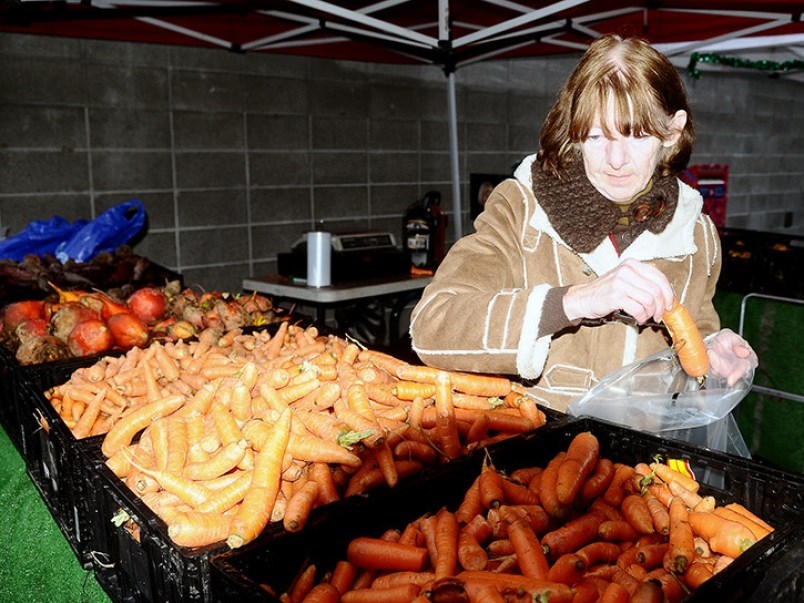Nearly a third of British Columbians buy food while thinking about the impact it will have on the environment and climate change — a rate that places С����Ƶ fourth among Canadian provinces, according to a new poll.
The survey, carried out by the Agri-Food Analytics Lab at Dalhousie University in partnership with Caddle, surveyed nearly 5,500 Canadians at the end of July 2023. Respondents were asked about a range of eating habits throughout the summer and how a changing climate affects their choices.
Lab director Sylvain Charlebois said the study shows the growing importance of climate-conscious eating habits and sustainable practices in agriculture
“Based on the results today, I think Canadians are more confident than politicians,” said Charlebois, pointing to the results.
In С����Ƶ, the poll results show residents' relationship with agriculture is “pretty healthy,” added the professor.
“It shows that people are engaged and aware,” he said.
Poll results reflect 'nature of agriculture'
The survey found residents of Quebec were the most likely to consider the environmental impact of their food choices, with more than 48 per cent saying they pay attention. Residents of New Brunswick and Ontario, came in at second and third, while respondents from Saskatchewan were the least likely to consider the environmental impacts of their food.
“I think it has a lot to do with the nature of agriculture. Saskatchewan feeds the world. Most of the food they consume comes from other provinces or countries,” said Charlebois.
Places like Quebec, on the other hand, produce and process the majority of their food, he added.
Across Canada, the poll found 37.6 per cent of respondents often or always consider the environmental impact of their food choices.
When it came to the impact of climate change on food more widely, more than half (53.3 per cent) said they were either very or extremely concerned about climate change. Another 21.3 per cent said they were either slightly or not concerned at all.
Overall, the survey also found nearly three-quarters of Canadians believe climate change is leading to unpredictable weather patterns.
Another 61 per cent of Canadians said they believe climate change is impacting Canada's ability to produce food, while over 47 per cent expressed concern about climate change impacting food availability.
“Agriculture has been adapting with climate for centuries. But over the last few decades, we’ve seen a lot of changes,” said Charlebois. “There’s a lot of hope out there.”
How much does food impact your carbon footprint?
After transportation and home heating and cooling, food is the third largest source of emissions for an average Canadian, according to a 2021 from the Hot and Cool Institute.
The report, which analyzes the average carbon footprints of 10 countries across nearly every continent, found Canada had the biggest lifestyle carbon footprint of any country studied (other slightly higher emitters, like Australia and the United States, were not included).
Canadians, found the study, need to reduce their personal emissions by 82 per cent from 2019 levels by 2030 if they want to do their part to keep global temperature rise below 1.5 C — the threshold scientists say will lead to catastrophic damage to the world climate system.
What you eat accounts for about 16 per cent of the average Canadian's carbon footprint. But the report found a combination of a vegan diet and more efficient food production could drop the average Canadian's dietary carbon footprint to 400 kilograms per year, down from a current average of 2,300 kilograms per person, according to the report.
"The big thing is going plant-based, reducing or eliminating meat, reducing or eliminating dairy," climate researcher Seth Wynes told Glacier Media in 2022.
Even dropping beef for other meats can make a huge difference. Together, meat accounts for over 60 per cent of all emissions from an average Canadian diet. And according to one 2018 , beef produces eight times more carbon emissions than pork and 10 times more than poultry.
Going vegan will help you reduce your personal emissions from food the most. But Wynes says it's only marginally better than eating vegetarian.
"How much emissions you save depends on your starting point. If you eat a ton of meat, you can save a ton of emissions by switching over," he said.
Summer eating habits
Unsurprisingly, many Canadians tend to shift their eating habits with the seasons.
This year, summer heat prompted 61.5 per cent of Canadians to modify their diets, the Dalhousie poll found. The top three summer cravings were fresh fruits, ice cream and frozen yogurt. More than half of respondents also said they crave salads and chilled vegetables, with only slightly fewer saying they prefer to opt for grilled meat and seafood.
When warmer weather comes, just under 30 per cent of Canadians said they dine outside at least once a week. Another 32.2 per cent of respondents, however, said they rarely or never eat outside.
The survey polled 5,450 Canadians. The results carry a margin of error of plus or minus 1.2 per cent.





